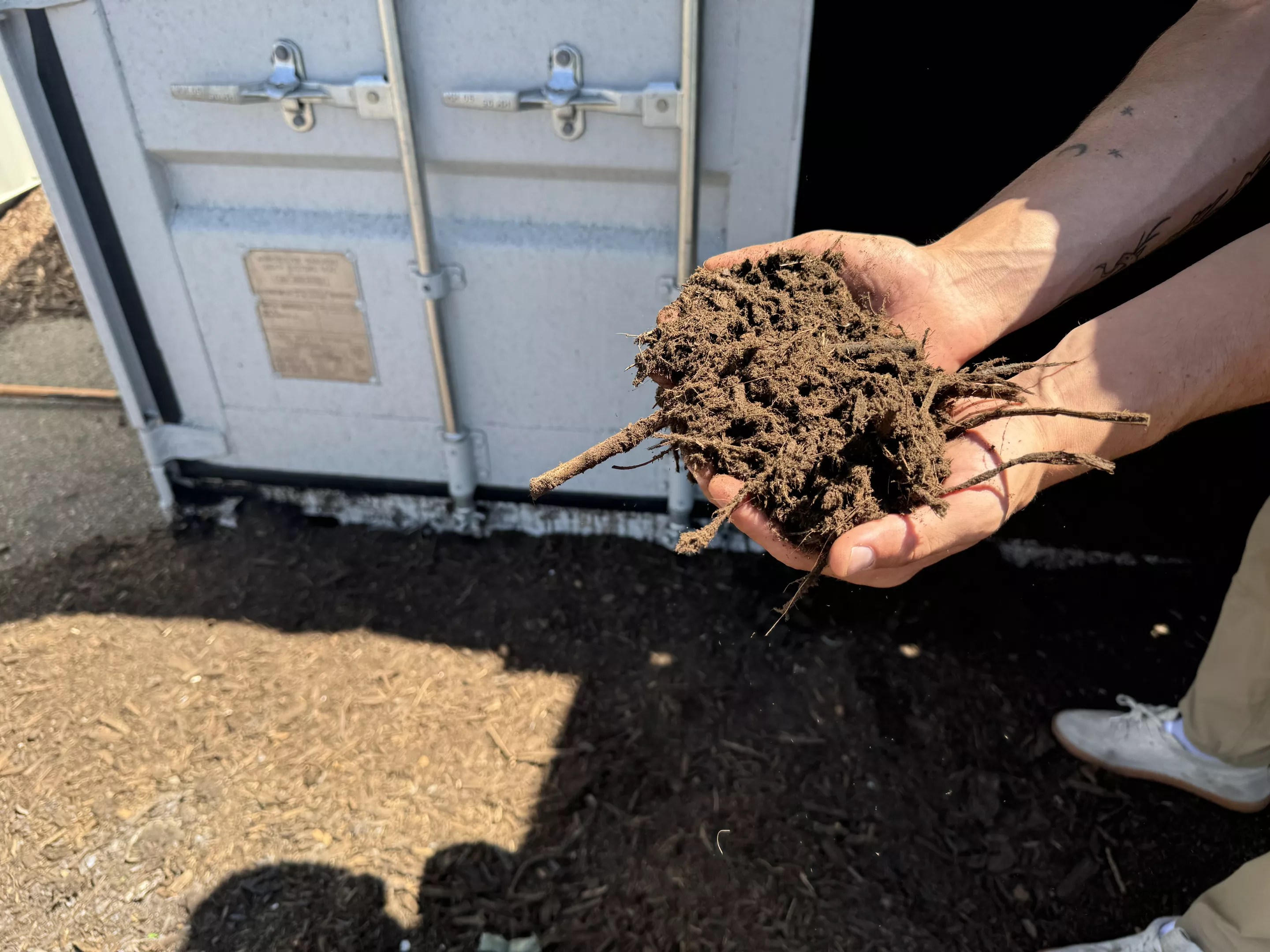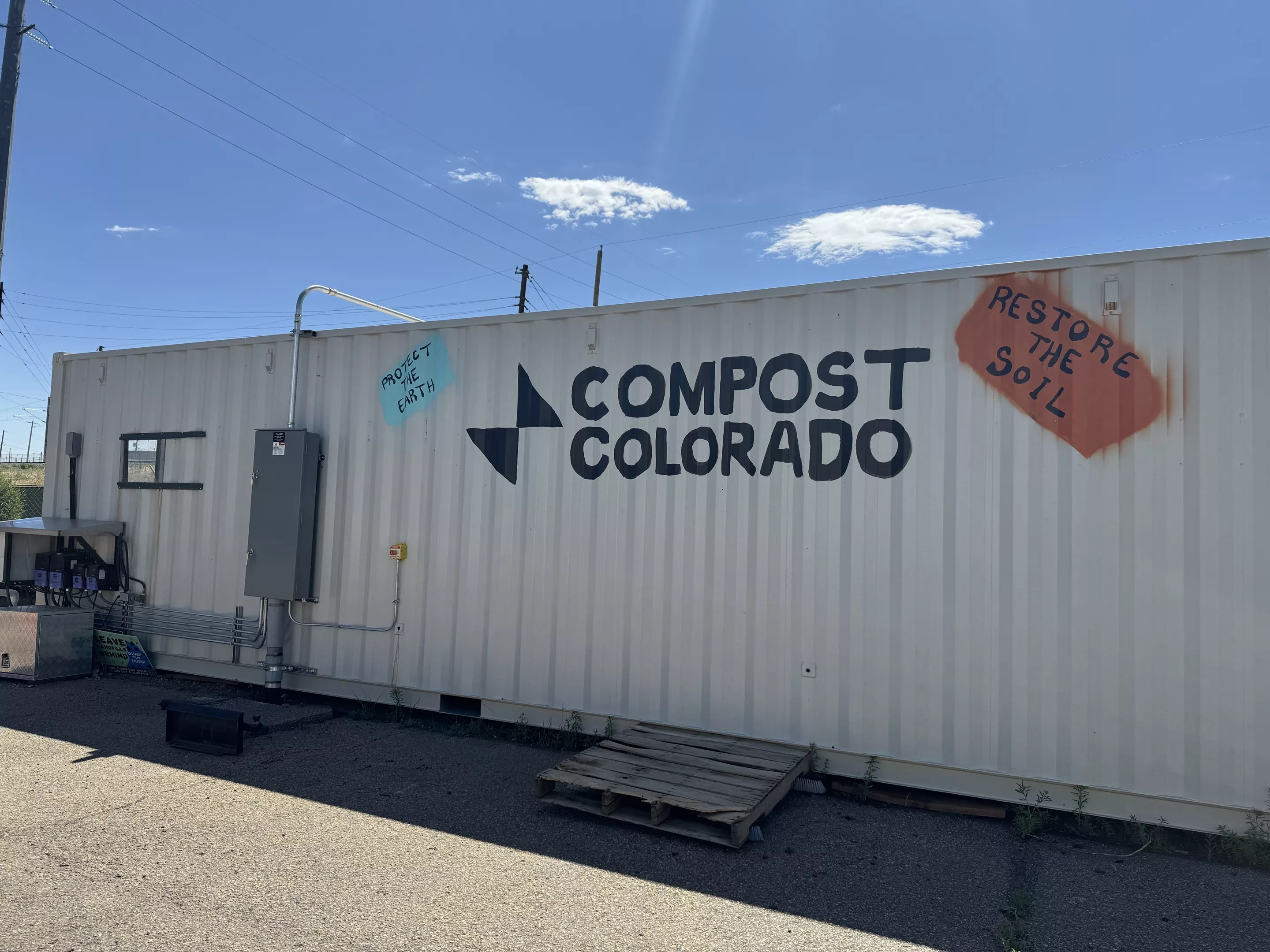
Catie Cheshire

Audio By Carbonatix
The National Western Center campus in Denver’s Globeville, Elyria-Swansea area is designed to attract visitors from across the country for the annual National Western Stock Show and a myriad of other events.
That’s a lot of trash to deal with after each event, so Compost Colorado and the National Western Center have partnered to reuse food waste on the campus. There are now two shipping container-sized units on an unused parking lot on the campus transforming waste into useable, nutrient-rich soil.
Organic waste collected on the campus will go directly back to the campus and the greater surrounding neighborhood. Compost Colorado and the National Western Center hope their collaboration can light the way for other organizations looking to reduce what they send to the landfill, especially as Denver is still trying to roll out a 2022 ballot initiative designed to require composting in all businesses in the city.
“Part of what’s happening in event centers and on campuses and in communities across the country and across Colorado is waste is being produced, and then it’s ending up being shipped out to a landfill, or maybe even being shipped out to a recycling facility,” says Noah Kaplan, executive director of Compost Colorado. “Oftentimes, when it comes to organics, you’re shipping that stuff out very, very far, so you’re eating into the environmental benefit of having diverted it from a landfill.”
With this partnership, waste doesn’t need to get hauled even a few miles. Garbage is given new life right where its life cycle would otherwise end.
Compost Colorado was founded in 2019 by Vann Fussell, a local environmentalist, to help people and businesses compost more easily. Since then, the city of Denver has switched to a trash system where every single-family household gets compost as part of the city waste services in an attempt to fix Denver’s poor waste diversion rate. But that system doesn’t help those who live in multifamily housing or local businesses, so Compost Colorado still serves over 2,000 members, processing over 2 million pounds of organic waste each year.
According to National Western Center chief operating officer Joe McCullough, Compost Colorado was able to rapidly step in and help haul compost from the Colorado Convention Center, where McCullough used to work, when a previous contract fell through.
When McCullough moved to the National Western Center, he knew that mitigating waste would be important and wanted to start up a composting program.
“When I looked them up, they were literally across the river from us,” McCullough remembers.
For the last several years, Compost Colorado had been trying to set up a home base in a former slaughterhouse in Globeville, but issues with the landlord and city zoning had tarnished that dream; McCullough’s call came at just the right time.
“They were kind of inhibited with what they could do, and we had opportunity here,” McCullough says. “They were able to come over, handle all of our compost, and, in turn, we give them space.”
Compost Colorado operates out of the maintenance and operations building for the National Western Stock Show, processing all of the National Western Center’s organic waste on site, as well as about 50 percent of the waste collected from other Compost Colorado members.

Compost Colorado was founded in 2019.
Catie Cheshire
National Western’s Big Sustainability Goals
McCullough says the National Western Center is trying to weave sustainability into everything on the campus from the start, as retrofitting sustainability into existing programs tends to be more difficult. The campus also has an ambient loop system that uses waste water to heat and cool buildings, which is the largest sewer-heat recovery system in the country.
Campus plans also include planting new trees, which compost can help with, and working with the Colorado Department of Public Health and Environment to install an automated sorting system for waste that crushes cans onsite. Officials want to service twelve different recycling streams on the campus with the goal of reaching an 80 percent diversion rate, as well.
“We will be able to tell you where we purchase things from and where they all end up,” McCullough says. “Which is the story that a lot of people want to hear, that it didn’t just go into a bucket and then go off to a waste site.”
Along with space at the National Western Center, Compost Colorado received $374,000 in grant funding from the CDPHE to develop the processing system on the campus. The two shipping containers use one-week and two-week cycles to transform a combination of coffee grounds, yard waste, wood chips and food waste into useable soil with mixing machines.
After compost is done in the shipping container, the soil cures for a month. Compost Colorado screens to make sure everything is properly broken down and will toss anything that isn’t back in the machine for the next round.
Unlike major compost processors, Compost Colorado includes accepted compostable packaging and non-coated paper in the mix. Both A1 Organics and Waste Management, which have served as the city of Denver’s compost contractor at various times, stopped doing so, reducing the amount of items that Denver residents will compost.
There are only fifteen composting facilities statewide. The Compost Colorado processing center is the first within Denver city limits, but Denver may need more soon.
Denver voters passed the Waste No More initiative by an overwhelming majority in November 2022. That measure will require all businesses, events and construction sites to recycle and compost, but the initiative has been delayed to at least 2026 as the city grapples with how to roll the program out fairly for small businesses. Concerns about a lack of processing centers and waste contractors for the influx have also arisen.
Compost Colorado and the National Western Center hope to show that localized composting infrastructure can be a solution to those problems.
“This is a small footprint, and it’s able to manage a remarkable amount of waste and turn it into something resourceful and valuable for the community,” Kaplan adds.
Composting food waste by city council district, neighborhood, event center or business district could be a solution to many problems the city currently faces with compost, according to Kaplan.
“We can’t treat organic material like recycling or trash,” he says. “We don’t produce it the same way. We don’t process it the same way, and we shouldn’t haul it the same way.”

Machines transform a combination of coffee grounds, yard waste, wood chips and food waste into useable soil.
Catie Cheshire
Compost Education Hub
Even if this pilot isn’t repeated across the city, Kaplan and McCullough say the chance to showcase the process educationally may also help.
“On top of the plans to create a model for a closed-loop waste systems and event centers and campuses, this is going to be an education hub,” Kaplan says. “This is going to be a place where you can learn about regenerative agriculture. Where you can learn about urban waste diversion and resource recovery, where we can start to repair our broken food system and our broken carbon cycle.”
Locating the processing center in the Globeville neighborhood, which has historically been one of the most polluted in the nation, is important, too.
“This is ground zero for environmental injustice and the fact that there’s an initiative here to remediate and repair the land, even in the small ways that a small composting company operating out of this campus can do, it’s a cool opportunity, and it’s one we’re really excited to explore,” Kaplan says.
Kaplan says Compost Colorado plans to offer free soil to Globeville residents and neighbors as well as pro-bono hauling services for events in the immediate area.
Compost Colorado and the National Western Center have committed to donating at least 10 percent of the soil produced to the Globeville and Elyria-Swansea neighborhoods for soil restoration projects, with McCullough saying they may donate as much as 20 percent.
Along with being donated to the community and given to Compost Colorado members, composted soil will also be used for projects around the campus by organizations like the Colorado State University Spur agriculture center, which may use the soil in research studies. Any excess will be sold.
McCullough promises there’s more to come under the partnership, while Kaplan teases garden beds and other agricultural programming.
“This is just the beginning,” Kaplan says.